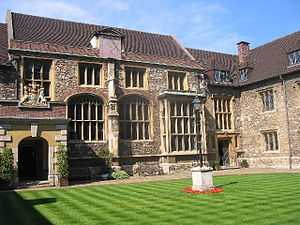Case of Sutton's Hospital
| Case of Sutton's Hospital | |
|---|---|
 | |
| Court | Court of Exchequer Chamber |
| Citation(s) | (1612) 77 Eng Rep 960; (1612) 10 Rep 32; (1612) 10 Co Rep 23a |
| Court membership | |
| Judge(s) sitting | Sir Edward Coke |
| Keywords | |
| Corporations, legal personality | |
Case of Sutton's Hospital (1612) 77 Eng Rep 960 is an old common law case decided by Sir Edward Coke. It concerned the London Charterhouse, which was held to be a properly constituted corporation.
Facts
Mr Thomas Sutton was a coal mine owner and moneylender, as well as the Master of Ordnance for the North of England, a military position. He founded a school and hospital as a corporation at the London Charterhouse. When he died, he left a large part of his estate to the charity. Sutton's other heirs, wanting more, challenged the bequest by arguing that the charity was improperly constituted. Therefore, they argued, it lacked a legal personality to be the subject of a transfer of property.
Judgment
In a full hearing of the Court of Exchequer Chamber it was held that the incorporation was valid, as was the subsequent foundation of the charity and so the transfer of property to it, including the nomination of a master of the charity to receive the donation, was not void. The other heirs to Sutton's estate were therefore unable to retrieve any additional assets.
Sir Edward Coke wrote in the report the following.
| “ |  Sir Edward Coke. And it is great reason that an Hospital in expectancy or intendment, or nomination, shall be sufficient to support the name of an Incorporation, when the Corporation itself is onely in abstracto, and resteth onely in intendment and consideration of the Law; for a Corporation aggregate of many is invisible, immortal, & resteth only in intendment and consideration of the Law; and therefore[1] cannot have predecessor nor successor.[2] They may not commit treason, nor be outlawed, nor excommunicate, for they have no souls, neither can they appear in person, but by Attorney.[3] A Corporation aggregate of many cannot do fealty, for an invisible body cannot be in person, nor can swear,[4] it is not subject to imbecilities, or death of the natural, body, and divers other cases. |
” |
See also
- UK company law
- Salomon v A Salomon & Co Ltd [1897] AC 22
- Lennard's Carrying Co Ltd v Asiatic Petroleum Co Ltd [1915] AC 705
- Northern Counties Securities Ltd v Jackson & Steeple Ltd [1974] 1 WLR 1133
- US corporate law
- Trustees of Dartmouth College v. Woodward, 17 US 518 (1819)
- Paul v. Virginia, 75 US 168 (1869), a corporation was not a citizen within the meaning of the Privileges and Immunities Clause
- Santa Clara County v. Southern Pacific Railroad Company, 118 US 394 (1886) in a property tax case, the US Supreme Court holds that corporations are obviously "persons" with the meaning of the Fourteenth Amendment.
- Minneapolis & S.L.R. Co. v. Beckwith, 129 US 26 (1889) corporations are persons for purposes of the Due Process clause of the Fourteenth Amendment.
- United States v. Martin Linen Supply Co., 430 US 564 (1977), corporations protected by the Fifth Amendment against double jeopardy
- Armour Packing Co. v. United States, 209 US 56 (1908) corporations can be “accused” and so under the Sixth Amendment have a right to a jury trial
- Citizens United v. Federal Election Commission, 130 S.Ct. 876 (2010) corporations are persons under the First Amendment and hence have the unlimited right to produce campaigning material at election times
Notes
References
- Wishart, D. (2010). "A reconfiguration of company law and/or corporate law theory". Journal of Corporate Law Studies 10 (1): 151–178.
External links
- "The Case of Sutton’s Hospital." from Sir Edward Coke, Selected Writings of Sir Edward Coke, vol. I, at the Online Library of Liberty